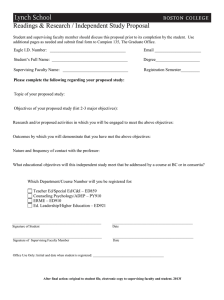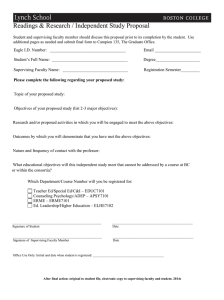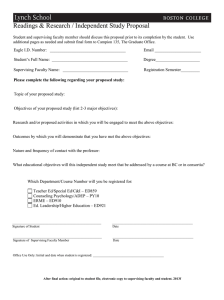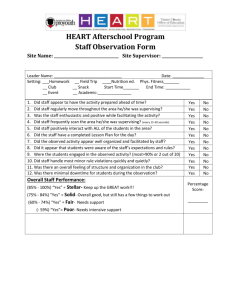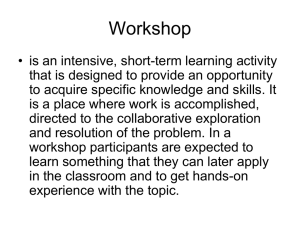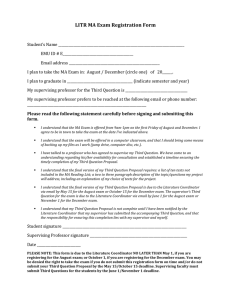Document 14093739
advertisement
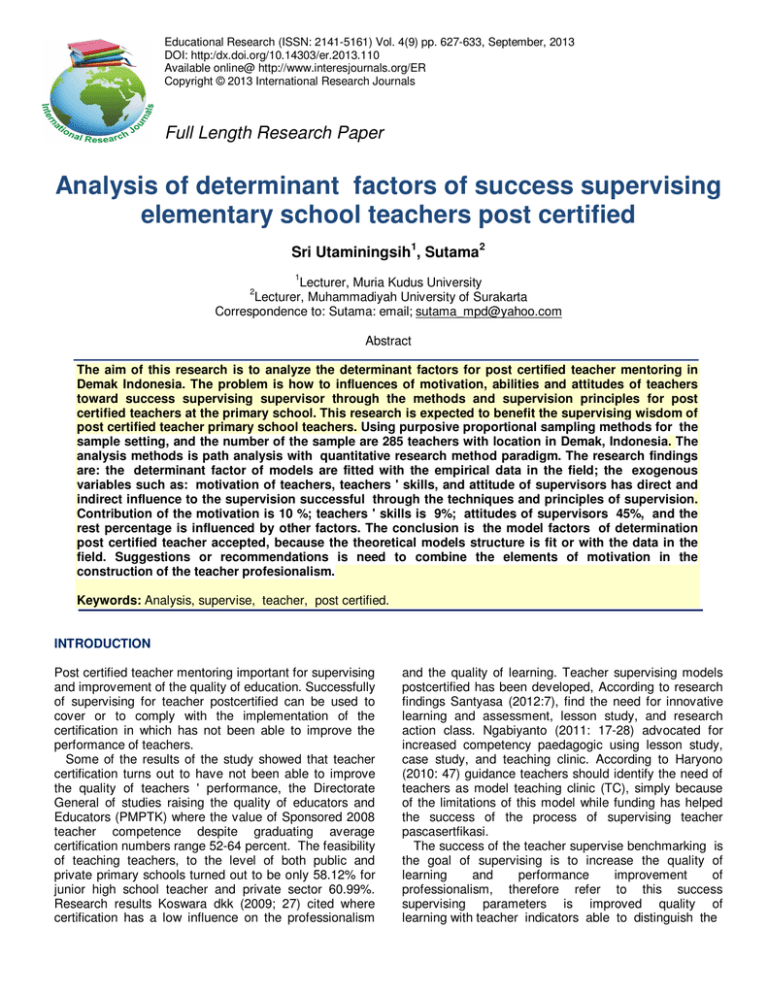
Educational Research (ISSN: 2141-5161) Vol. 4(9) pp. 627-633, September, 2013 DOI: http:/dx.doi.org/10.14303/er.2013.110 Available online@ http://www.interesjournals.org/ER Copyright © 2013 International Research Journals Full Length Research Paper Analysis of determinant factors of success supervising elementary school teachers post certified Sri Utaminingsih1, Sutama2 1 Lecturer, Muria Kudus University Lecturer, Muhammadiyah University of Surakarta Correspondence to: Sutama: email; sutama_mpd@yahoo.com 2 Abstract The aim of this research is to analyze the determinant factors for post certified teacher mentoring in Demak Indonesia. The problem is how to influences of motivation, abilities and attitudes of teachers toward success supervising supervisor through the methods and supervision principles for post certified teachers at the primary school. This research is expected to benefit the supervising wisdom of post certified teacher primary school teachers. Using purposive proportional sampling methods for the sample setting, and the number of the sample are 285 teachers with location in Demak, Indonesia. The analysis methods is path analysis with quantitative research method paradigm. The research findings are: the determinant factor of models are fitted with the empirical data in the field; the exogenous variables such as: motivation of teachers, teachers ' skills, and attitude of supervisors has direct and indirect influence to the supervision successful through the techniques and principles of supervision. Contribution of the motivation is 10 %; teachers ' skills is 9%; attitudes of supervisors 45%, and the rest percentage is influenced by other factors. The conclusion is the model factors of determination post certified teacher accepted, because the theoretical models structure is fit or with the data in the field. Suggestions or recommendations is need to combine the elements of motivation in the construction of the teacher profesionalism. Keywords: Analysis, supervise, teacher, post certified. INTRODUCTION Post certified teacher mentoring important for supervising and improvement of the quality of education. Successfully of supervising for teacher postcertified can be used to cover or to comply with the implementation of the certification in which has not been able to improve the performance of teachers. Some of the results of the study showed that teacher certification turns out to have not been able to improve the quality of teachers ' performance, the Directorate General of studies raising the quality of educators and Educators (PMPTK) where the value of Sponsored 2008 teacher competence despite graduating average certification numbers range 52-64 percent. The feasibility of teaching teachers, to the level of both public and private primary schools turned out to be only 58.12% for junior high school teacher and private sector 60.99%. Research results Koswara dkk (2009; 27) cited where certification has a low influence on the professionalism and the quality of learning. Teacher supervising models postcertified has been developed, According to research findings Santyasa (2012:7), find the need for innovative learning and assessment, lesson study, and research action class. Ngabiyanto (2011: 17-28) advocated for increased competency paedagogic using lesson study, case study, and teaching clinic. According to Haryono (2010: 47) guidance teachers should identify the need of teachers as model teaching clinic (TC), simply because of the limitations of this model while funding has helped the success of the process of supervising teacher pascasertfikasi. The success of the teacher supervise benchmarking is the goal of supervising is to increase the quality of learning and performance improvement of professionalism, therefore refer to this success supervising parameters is improved quality of learning with teacher indicators able to distinguish the 628 Educ. Res. characteristics of learners, to implement the principle of learning and teaching materials and evaluation according to the characteristics of the students. Professional performance indicator of this is there is an increased test results Improved relationships with KUA, colleagues and More understanding about the functioning of the profession (Hammond, 2000; Brewer,1997; Heck,2007; Monk, 1994; Strauss and Sawyer,1986; Suyanto, 2012; Houle,1980). Research on the influential factors on the success of many teacher training in meticulously by experts, Bafadal (2001: 1) find the influence of constancy principle of supervising. The principle is the reference that is used in the construction of indicators in this study, namely the construction carried out scientifically, democratically, comprehenship and constructive as well as paying attention to aspects such as availability of supporting speakers or instructors, facilities and funds (Segiovani, 1987; Glickman,1981; Gwyn, 2002). Sundari (2002) takes more looks at the techniques that are taken to carry out the construction. Construction techniques is the way used in individual supervising that be executed when the teacher asks for guidance on its own, the techniques is using personal visits, teacher orientation etc, and the group techniques if many teachers who are experiencing the same problems, and the techniques could be used are meetings, workshops, seminars, etc. Direct techniques can be describe such as: convene a meeting of teachers, worksop, visiting classes, hold a conference. While indirectly, for example via bulletin board and questionaire. (Gwynn,2002 in,2006 Bafadal: 13; Sahaertian in,2010: 173 Sagala). Yung (2009: 17) says supervision or guidance teacher performance enhancement requires an attitude of patience and tolerance. Supervisor's attitude indicator in the study viewed from the position of supervisor, i.e. direct or indirect supervisor of teachers, active and open relationship as a humane, humanist, placing teachers as object and subject. (Mantja, 1998: 8; Baedhowi, 2001: 4). Yung also mentioned that teacher performance is determined by the motivation of teachers to improve themselves personally with indicator such as: boost/motives, goals and motivation work achievement (Santrock, 1993: 131; Kenneth et al., 1977: 77; Mc. Cleland, 1987). In addition, the successful of supervising to teacher is also determined by the ability of the teachers themselves. The ability of teacher's can be detailed are the ability to perform administration, teaching and tutoring students (Garry Thomas,1997; Margareth Thomas, 2007). Refer to the discussion mentioned above, it can be concluded the existence of a number of factors that affect the construction of the teachers in this study post certified teacher’s and looking for the factors that influence the successfull of the process of supervision post certified teacher’s at the primary school, so the problems of this research is whether the motivation, the ability of the teacher and the supervisor's attitude influence directly and indirectly towards the successfull of supervision through the principles and techniques of supervision for the post certified teacher’s at primary school in the District of Demak, Indonesia. The goal of this research is to find a successfull supervision models for post certified teacher’s at primary school teachers in the Demak District. The results of this study are expected by finding the determinant factors in the process of supervision the good supervise to the post certified teacher’s can be done. RESEARCH METHOD Sampling was conducted in purposive random sampling proportional to the criteria: has gained supervising teacher post certified, primary school teachers under the ministry of national education, affordable living in the region then elected District 3 sub-district Demak City represented the city district and sub-district Mranggen represents a district close to the city of Semarang and Karangnyar District (Dantes, 2006). Data collection techniques used such as follows: questionnaires, interviews, and documentation. Research instruments such as questionnaires and i Quantitative research methods study was based on ex-post because it aims to reconstruct or confirm a theory of several factors that influencing the successful of supervision for elementary school post certified teacher’s (Dantes, 2012: 60-62). This research was conducted in the District of Demak, Indonesia with the subject post certified teacher’s. The population of this research is all primary school teachers in Demak Regency are certified educators under the Education Department started in 2006-2011 with the amounts to 1505. The sample size n = 285, as determined by Isaac and Michael formula’s (Sugiono, 2006: 126-128). The Sampling methods is purposive random sampling proportional with in criteria: has gained supervising teacher post certified, primary school teachers under the Ministry of national education, affordable living in the region then elected District 3 sub-district Demak City represented the city district and sub-district Mranggen represents a district close to the city of Semarang and Karangnyar District, Indonesia (Digital, 2006). Data collection techniques used are as follows: questionnaires, interviews, and documentation. Research instruments such as questionnaires and interview guidelines were also used. Questionnaires that are used to retrieve data with validity tests meets the formula and reabilitas momet and product (Sutama, 2012: 94; Arikunto, 2006: 168). Data analysis techniques using path analysis processed with lisrel for acquiring goodnes of fit of the model and software version 16 Cuckold Kelly wells. (Ghozali, 2005: 306). The Regression equation is Y = a Utaminingsih and Sutama 629 b1 + X 1 b1X2+ b1X3. Test assumptions made include test normality by looking at the data declared Gaussian if the value of the P-Value is greater than 5% significance level of 0.05, or linieritas test and multi-colinearity test by looking at the results of the calculation of the Correlation Matrix of Independent Variables in the table is obtained under the r score is 0.09 (Sugiyono, 2006: 235). Data Analysis Data analysis techniques using path analysis processed with lisrel for acquiring goodness of fit models with software version 16 Cuckold Kelly wells. Previously done test the assumption of normality test covers by looking at the data declared Gaussian when the value of the PValue is greater than 5% significance level of 0.05, or linearity test and multicolinearity test by looking at the results of the calculation of the Correlation Matrix of Independent Variables in the table is obtained under the r score is 0.09 (Sugiyono, 2006: 235). The analysis shows the Goodness of Fit of statistica RMSEA. 0.18, NFI, CFI, GFI of 0.99, AGFI of 0.89. Thus it can be said if the model has been drawn up can be accepted as a model of equal, or balanced. (Ghozali, 2005: 306). The full Model is presented within the framework of thought in test by using Lisrel and produce a full model as follows (Figure 1.1). The regression equation obtained Y = X 1 0.9941 X 2 0.5153 11.340 0.844 X 3.It shows there is a positive impact cumulatively between three non-independent variable to the variable with the level of significance of 0.01 so believable that it is true there is a positive influence. R reach 0.793 and R square of 0.629, it can be inferred if the variable work motivation, ability and attitude of the teacher supervisor directly affect the success of the construction of 63% while the remaining 37% are affected by other variables that are not included in the model.The detail of the direct and indirect influences on top of table 1.1 can be compiled as follows. RESULTS AND DISCUSSION This study analyzed the motivation factors of work, the ability of teachers, supervisors, attitudes, principles and techniques of supervising success supervising elementary school teacher postcertified. First, Based on the analysis of the data is known to be the highest value from the respondents to the motivation of working 100 and the lowest value is 69. Average value calculation results average motivation kerjasebesar of 84.51, the median and the mode of 80.00, 84.00, and standart deviasinya 6.29 and range score 31. Descriptive variables work motivation of teachers showed that only 27% of respondents who have a teacher motivation of working under average, 27% on an average class, 45% above average. The variable contribution of work motivation techniques, principles of supervising supervising 0,101 amounted to 0.26, 0.27 supervising success with positive direction, it means the better the better the working motivation techniques and principles are to be applied supervising and this will affect the success of supervising. Results of the research on the motivation of teachers post certified work is in line with the findings of the competence development of teachers that Yang was greatly influenced by motivation, supervising techniques and also the basic capabilities of teachers. Motivation is the effort to do something. In the construction of teachers ' work motivation is necessary, because it will encourage a teacher towards a better future. Someone in doing something or achieving certain targets needed encouragement, encouragement from inside (internal) may out of necessity as well as from the outside (external) because of environmental factors (Yang, 2011; Mulyasa, 2005: 47; Tilar:, 2002 67, Robbin, 2003; 187). Results of research work motivation post certified teacher is also the same with the opinion that Lizarraga Elawar (2007: 565-592), motivation, encouragement for the successfull achievement of a training. Teacher motivation is a form of desire or urge to upgrade voluntarily or with a sense of love, not forced to follow the guidance. Thereby, it is understood the relation between motivation of working with success supervising since supervising function when implemented with be sincerely earnest can increase the motivation of teachers' work. Additionally during this supervising techniques in conducting the election, the Builder is trying to use techniques that are varied, the motivation of working teachers often will improve techniques in supervising, if teachers work motivation in following the construction of the well, then it will easily adapt to the construction techniques used. Supervising is done with sustainable materials vary (Poerksen, 2005; Elawar, Lizarraga, 2007: 565-592; Sergiovani,1987: 47; Bafadal, 2006: 45). In general aspects in the work motivation can be compared with the apportionment of motivation according to Mc Clelland (Widiyanto, 2010) is divided into 3 need achievement i.e.; affiliation achievement, Power achievement, and Prestige achievement. The 3 achievement has also been used to check the teacher motivation in Korea for junior secondary school teachers. The finding are motivation improving teachers' achievement in the spirit of adding knowledge, then improves teachers friendship motive in sharing with friends to enhance learning in the classroom, they share and exchange experiences on the group which was facilitated by the district, are powerful motivation improves leadership attitude and enthusiasm in order to guide their students (Widiyanto, 2010: 17-27). The result in this study shows aspects of the motive or the encouragement of work demonstrate a high motivation, judging the research findings have influenced 630 Educ. Res. Figure 1.1 Models of the relationship between variables based on test track analysis Table 1.1 Summary of direct and indirect Influence 1. Work Motivation 0.27 Indirect Influence TS PS 0.5124 0.3064 2. 3. Teacher Ability Supervisor Attitude 0.28 0.79 0.0624 0.0960 No Variable Direct Influence 0.0360 0.0168 Pengaruh Total Inf TS 0.7824 PS 0.5764 D>ID 0.3424 0.8860 0.3164 0.8068 D>ID D>ID Information: TS : technique of supervise, PS: Principle of supervise, D: Direct, ID: Indirect nearly 45% from 51% total influence motivation towards success supervising. This aspect of the ability to complete a difficult task is also an accomplished and wishes can also be classified on power achievement aspects of motivation because with the ability to accomplish difficult give prestige and authority that allows it to acquire its own class, this is if the motivation is linked to social as it is adduced by Atkinson in Widiyanto (2010), a performance in the results that appear from the motivation combined with existing circumstances. It appears as a motif or desire, is the tendency to strive in particular on one type of (24) than the desire or goal for example: achievements, relationships, and power (Hartoyo, 2009: 7; Widiyanto, 2010, 17-27). Aspects of this feedback can go in a category for affiliation achievement in Mc Clelland, because it will result in a relationship with groups namely colleagues, teachers, students and might even give feedback on a wider scale. In the construction of clear objectives and targets have clearly indicates the optimum work results aspects (Mantja, 1987: 17; Baedhowi and Hartoyo, 2009: 7) there is a slight difference in the motivation of teachers working in this study with the results of other studies to determine the competency of teachers of post certified, that the motivation of teachers to immediately join the certification was not to increase their competence or professionalism, but impressed merely to earn additional income through the tunjuangan profession. A similar case is found to the Directorate-General PMPTK Monev when doing similar studies in the province of West Sumatra, East Java, Central Java, South Sulawesi, and Nusa Tenggara Barat in 2008.The study found that the reason teachers following the certification, among other things, in order to benefit the profession, soon got the money to meet the necessities of life, the allowances for tuition fees, the cost of children's education, renovating a House, and pay debts. (Baedhowi and Hartoyo, 2009: 7;D IG PMPTK Mone, 2008; Suharta, and sublime Sudiarta, 2009: 17). While in the study of motivation used to base the participation of teachers in supervising. Results of the discussion above, it can be concluded if the success of the construction can be based on work motivation of teachers. The better teacher working with Utaminingsih and Sutama 631 techniques and principles motivation then also better supervising and this affects the success supervising teacher post certified. Second, Based on the data analysis capability of the teachers known to be the highest score of 130 and the lowest value is 75. The median value calculations the average teacher's ability of 99.85, median of 90.00 and 90.00 registration mode, as well as raw Byway 1.03. as well as the range to score 55. Descriptive variables teacher capabilities that 40% of teachers who have the ability under the average, 60% in class average and above average. Results of the study indicate that there is a direct and indirect influence on the ability of teachers. The variable contribution of teacher skills supervising techniques amounted to 0.69, principles of supervising of 0.40, 0.28 of success supervising with positive direction, it means the better the ability of teachers getting better supervising techniques and principles are being applied and this affects the success supervising. The analysis results also showed a 9% changes occurring on the supervising techniques, principles, supervising, supervising success is directly attributable to a change in the ability of the teacher. There are three aspects that are developed in this research are: (1) the ability to conduct related administration; (2) learning-related Skills; and (3) the ability of supervising related. From these aspects in detail is the primary ability competence of paedagogic occurring on the supervising techniques, principles, supervising, supervising success is directly attributable. A related aspect of the ability to perform administration, from the results of the teacher responses through answering the question is enough to top more than 52%, and only about 11% less expressed, from the answer then it can be said to be actually starting ability teachers can be said to be good enough for the administrative matters, the ability of a carrying capacity for teachers for success in education, it is related to the problem assessment, attendance and assignments from other students. The Administration also strongly supports the capability on the order and discipline of teachers, will further enhance the efficiency and effectiveness of teacher work (Mulyasa, 2005: 47; Tilaar,2002: 67; Mohammed, 2002: 47). Aspects of learning-related skills, the result of respondents very moderate once where between sufficient and are somewhat less almost proportional i.e. 51% compared to 49% for less, through this ability is crucial for teachers, teaching the correct paradigm should be based on the ability of teachers, the ability not only to the knowledge owned by the teacher alone, but the capabilities are a number of competencies that must be possessed by the teachers, and the ability and motivation in the construction of much-needed basic supervising teacher (Poerksen, 2005, 471-484; Shermer Danziger 2004,147; Elawar, Irwin, 2007 Lizarraga, 565-592) A related aspect of supervising ability, objective function for the teacher to the students is required it is primarily in the teaching and learning activities, and others. Realize the construction on the ability of the required understanding of the limits of ability of teachers, it is because the primary purpose of stating the supervising to improve the quality of learning and professionalism. Professionalism of teachers refers to productivity, therefore it can be said the purpose of the construction of teachers includes on scientific insight: growth, thinking, attitude towards work and skills in the implementation of its job everyday until its productivity can be improved (Sundari; 47: 2002). In the construction of the teacher post certified not preceded by the identification of issues and clearly appropriate characteristics, whereas the construction without knowing the initial capabilities of teachers actually useless, due to the success and the failure is hardly measurable. (Agee, 2004, 747-774; Poerksen, 2005, 471-484; Shermer Danziger 2004,147; Elawar, Irwin, 2007 Lizarraga, 565-592). A basic introduction on the ability of teachers and the motivation for supervising has a goal to improve techniques in supervising, the precision engineering continues on election success rate, although this is not an absolute determinant, but 80% of the results showed the spring thing. Utilizing the basic ability to supervise success of teachers can be done by detecting the teacher is cross-sectional i.e. through identification of teachers in private, student responses to teacher's ability in learning, and information colleagues. (Bembenutty, 2007: 165; Perry (2008; 271) So it is evident that the variable ability of teachers based on research findings and results of the research there were also former dependencies with success supervising. For it in the construction of early identification of skills needs to do teacher training so that more precise targets and compliance problems faced the teacher postcertified. Third, Based on data analysis is known to be the highest value from the respondents for the supervisor's attitude and the most value 55 low 33. The median value calculations the average attitude of supervisors 44.74, median of 44.00 43.00 and a mode, as well as raw Byway 4.23. as well as the range to score 55. Descriptive variables of the supervisor's attitude that only 13% of respondents stated that teachers under supervisor's attitude, on average, 27% on average, class of 87% on grade average and above average. Supervisor's attitude in supervising has a direct and indirect influence. It is seen from the variable contribution of supervisor attitudes of supervising techniques, principles of supervising 0.122 0.40, success supervising with the positive direction of 0.79, which means the better the supervisor's attitude is getting better all the techniques and principles of supervising. The analysis results also showed 45% with changes in supervising techniques directly caused a change in the attitude of the supervisor. 632 Educ. Res. These findings indicate that the ability of the supervisors are qualified as a builder. It reaffirmed the view that the teacher supervisor in the construction by use of some techniques, both techniques were in groups or individually and directly and indirectly However, from the results of the interview there are a few supervisors who have limited capabilities for being the supervisor because the position. More teacher morale when a supervisor has no direct bearing or not direct superiors such as school principals, trustees and patrons of the District Education Office. A supervisor must have terms as follows: (1) have the confidence that the teacher has the ability or potential to solve the problem themselves and develop themselves; (2) has the willingness and the ability to be able to build a relationship that is intimate and warm with everyone indiscriminately; (3) have the ability to listen as well as a desire to take advantage of the experience of the teacher as resource persons experience led him to attempt to achieve objectives; (4) has a antusiaisme and keyakian on clinical supervise as the process of continuous activities to serve the personal growth and development as well as the teaching profession; (5) have skills in communicating, observing, and analyzing the behavior of the teacher teaching, and (6) have a commitment to devote himself and wish hard to continue to deepen the supervision. So for, there is still a postcertified teacher and supervisor connections less maximum which caused many post certified the number of teachers and supervisors are limited. Teacher expectations against the supervisors, among others, to got the service to its full potential without fear, then the teacher wanted a supervisor who mastered the learning, welcoming and respecting teachers. In accordance with the Sagala's opinion, the teachers hope for supervisor requirement such are: (1) has the earnest attention of learning and school management; (2) being sympathetic, open, confident; (3) has the power of humor is not easily offended; (4) critical but constructive;(5) broad knowledge; (6) physical health, well-dressed and polite. (Sagala, 2010: 236) Facilitation activities supervisor in the construction of its central character is a teacher which is expected to improve its quality, while the supervisor acts as a facilitator is a main factor should drive to the teacher, for that is the role of the facilitator should provide assistance to teachers in order to achieve the goal by providing opportunities on teachers to: (1) examine, discuss and explain in full program-learning programme; (2) receive objective feedback on the program a program that trained/practiced; (3) test the real behavior and relationships that are anticipated in the classroom; (3) examine the relationship between the desired consequence and konsekwensinyata behavior of supervisors and teachers; (4) examine the relationship between the program along with the assumptions, theories and research about effective teaching; (6) develop, implement and receive support regarding the changes according to educational programs that are practical. The spirit and the paradigm according to the new paradigm about supervising against the teacher who must be humane, no longer considers the teacher as object construction or in economic language as a factor of production but as an asset that must be preserved and developed. The findings of other studies mention the development of education on teachers through professional organizations more successfully when it is treated the same and parallel. The presence of the facilitator in the Organization are more considered due to teachers appreciate not being arrogant, but actually facilitating. (.(Sergiovani, 1983: 87;Martoyo, 2008; Mantja, 1998: 18; Morteza, 2000: 16). The supervision at least have to parties such as: supervisee. Both of two parties have two maintain the cooperation during the supervision process, and also keep the relationship equity. Keeping the supervising relationship then a supervisor should have the properties of flexible (flexible) to understand the subject matter in the sense that should be nurtured. Luwesan of a Supervisor (supervisors) often hinders the process of development, in delivery patterns, the introduction of new informsi the result of innovation or the delivery of a number of rules and policies are not a necessary communicators over acting and arrogant, because it would hamper the process of acceptance (Schofield, 2004: 217, Keating,2003: 367, Muller,2000: 316). Success supervising relationship with the supervisor's attitude can be said strongly enough either as seen from the results of this study as well as a number of other studies simply provide a description of the magnitude of the influence of supervisor attitudes in supervising. Whether or not a respected Builder of subjects of supervising will greatly affect the success of supervising (Taylor, 1988: 287-295). Based on an analysis of the research results and expert opinion indicate that the attitude of the supervisors affect the success supervising teacher postcertified so in the construction supervisor's attitude is expected to better appreciate, humanist, dynamic and not positioned as a boss. CONCLUSION Regarding the testing results analysis using SEM can be summed up as follows: each independent variable has a direct and indirect influence as well as the dependent variable of donations which can be specified as follows in direct contributions to the work motivation of 0.27 indirectly totalling 0.5124; teachers ' contributions directly by 0.28, indirectly totalling 0.3424; contributions directly to the supervisor's attitude amounted to 0.79, indirectly totalling 0.886; It is evident that success supervising teacher postcertified is affected by the variable technical supervising and supervising principles. Influence of the Utaminingsih and Sutama 633 slightest factor could not be ignored, because it affects the level of success of the construction of the postcertified primary school teachers in the District of Demak; the exogenous variable proven work motivation, ability and attitude of teachers, supervisors and technical effect on the principle of construction of the primary school teachers in postcertified district of Demak, this proves that the selected variables to support variable engineering and construction principles have significance. Conclusion based on the above, can be suggested as follows: (1) this Model can be used to test things that affect success supervising, because it has confidence in the fulfillment of Goodnes of Fit; (2) variable that his contributions were small in the implementation guidance should be used because it has a fairly significant role; (iii) Technical Factors fostering and good supervising principles need to get attention relevant agencies in realizing success supervising; (4) need to do more research to reveal other factors that can provide kontribudi to increased success supervising REFERENCES Agee J (2004). Negotiating a teacher identity: An African-American teacher’s struggle to teach in test-driven contexts. Teachers-College Record. Baedhowi and Hartoyo (2005). Laporan 2005 Learning Round-tabel on Advanced Teacher Profesionalism. Bangkok, Thailand 13-14 June 2005. Bafadal I (2006). Pentingnya Peningkatan Kemampuan Profesional Teacher Sekolah Dasar. Jurnal Pendidikan Inovatif Volume 1, Nomor 2, Maret 2006 Barnes JG (2003). Secrets of Customer Relationship Management (rahasia Manajemen Hubungan Pelanggan). Andi, Yogyakarta. Bembenutty H (2007). Pre-service Teachers’ Motivational Beliefs and Self-Regulation of Learning. Paper presented at the annual meeting of the American Educational Research Association, Chicago. Dantes N (2012). Metode Penelitian. Andi Offset, Yogyakarta. Danziiger K, Shermer P (2004). The Varieties of Replication: A historical Introduction. Ablex Publishing Corporation :Norwood New Jersey Elawar MC, Irwin L, Lizarraga MLS (2007). A Cross Cultural Analysis of Motivational Factors That Influence Teacher Identity; Electronic J. Res. Educ. Psychol. N. 13 Vol 5 (3): 1696-2095. Gwynn P (2002). A Cross Cultural Analysis of Motivational Factors That Influence Teacher Identity; Electronic J. Res. Educ. Psychol. 5 (3):1696-2095 Koontz H (1997). Management Ninth Rdition. Mc. Graw Hill Book Company, New York. The manufactured crisis: Myths, frauds, and the attack on Maerica’s public schools. White Plains: Longman Kotler P, Gary A (2004). Dasar-Dasar Pemasaran. PT Indeks Kelompok Gramedia: Jakarta Moore R, Muller J (2002). The Growth of Knowledge and the Discursive Gap. Br. J. Sociol. Educ. 23(4): 627-637. Poerksen B (2005). Learning how to learn, Kybernetes, Vol. 34 No. 3/4, 2005 pp. 471-484, Emerald Group Publishing Limited Robbins SP (2003). Organizational Behaviour: Consepts, Controversies, Applications. Prentice Hall: New Jersey Russell LA (2009). Was an American organizational theorist, consultant, and Anheuser-Busch Professor Emeritus of Management en.wikipedia.org/wiki/Russell_L._Ackof Schofield K, McDonald R (2004). Moving on reporto f the highl evel reviewo f training packages. Brisbane, Australian National Training Authority: Australian Sergiovanni TJ (1987). The Principalship: A Reflective Practice Perspectives, Allyn & Bacon,:Boston Sutama (2012). Metode Penelitian Pendidikan. Kuantitatif, Kualitatif, PTK, R&D. Faruz Media, Kartusuro. Sundari S (2002). Upaya Meningkatkan Mutu Proses Belajar Mengajar Di SD Pertiwi II Dengan Pemahaman Kurikulum Berbasis Kompetensi , Dinas Pendidikan Kota Bandung Propinsi Daerah Tingkat I Jawa Barat Yang MC (2011). Motivation in Adult Education: A problem solver or a euphemism for direction and control. International Journal of Lifelong Education; USA How to cite this article: Utaminingsih S, Sutama (2013). EAnalysis of determinant factors of success supervising elementary school teachers post certified. Educ. Res. 4(9):627-633
